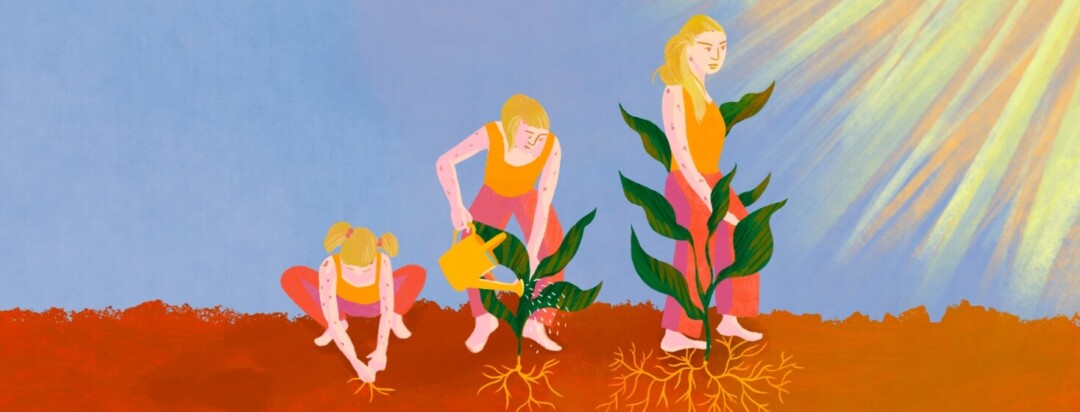Growing Up With Plaque Psoriasis
My own personal journey with severe scalp and plaque psoriasis began at age 12. I was quite excited to be sent off to the mountains for the authentic sleep away camp experience! Shortly after arriving, I started to feel unwell and overwhelmed. My scalp and lips became completely covered in thick painful plaques. My family and I assumed that eventually my symptoms would subside but unfortunately, they did not and only spread to other areas like my hairline, elbows, and knees.
Featured Forum
View all responsesIt took five long years to finally obtain my diagnosis from a pediatric dermatologist in the year 2000. I was grateful for the clarity and saddened by his poor delivery. With resources being so limited in those days, it was quite a challenge navigating the physical and emotional toll, along with misconceptions amongst my peers and support system. In hindsight, there were definitely things my family and I could have done differently!
Here are some things that I would have benefitted from personally as a child living with psoriasis.
Shifting moods
As we all know, growing up comes with its own set of unique challenges, made more difficult when navigating an uncomfortable chronic illness like psoriasis. The relentless itch, burning, stares, and comments would take a toll on anyone! As a child, I often became irritable, frustrated, and what was perceived as disobedient. Take some time to ask your child how they are really feeling and try and be as patient as possible! This may take some encouragement and time, I was not always eager to be vulnerable. All I really needed was a hug, validation, and to be reminded that I was not alone.
Dealing with the itch
Even as a 36 year old psoriasis veteran, I STILL have a hard time not scratching! Keeping my nails short and clean is a good practice. I remember some of my plaques turning green from infection. It’s important that we pay special attention to their fingernails as to prevent further damage and possible complications. A great way to help combat this is by having your child pick out their own ice packs and having them available in the freezer to apply when necessary! Get creative with it, there are a variety of fun options or lots of great DIY projects online to make your own! Turn this inconvenience into a fun bonding moment!
Finding clothes with more coverage
If possible, allow children to wear long sleeved shirts or pants that morning, despite feeling the weather might not be appropriate. Even now, my comfort level with showing my skin varies day to day. Growing up in Los Angeles, California where it is mostly hot, I spent many 80+ degree days in jackets and sweaters due my lack of options. Check out clothing with more coverage that is breathable and not too overwhelming on warmer days. Get your kids involved and ask how you could help them feel most comfortable! Try and keep an open mind to their suggestions with the goal of their comfort in mind!
Finding natural skincare and household products
Do some research. Look into the products you regularly use and see if they could possibly be aggravating your child’s psoriasis. In my teens, we switched to a natural laundry detergent that actually made a difference!
Talk to adults who have interactions with your child
Communicate with teachers, coaches, family members, school staff and more about your child’s health. One of the most anxiety inducing aspects of navigating psoriasis as a child was the lack of support from some of my teachers and other adults. I was dealing with intense itch, burning skin, and fatigue daily. I could not concentrate on my work and to be honest, I was depressed. Having their understanding would have been a game changer!
This or That
Are you currently experiencing a psoriasis flare?
Ask questions
Talk to your child’s doctors and ask for tips and suggestions. Pediatric physicians might have useful insight from their years of experience or might know of resources that can help! Additionally, do not hesitate to get a second opinion or make a switch if you feel your child is not getting the assistance or treatment they deserve. In hindsight, seeking the input of a therapist or mental health professional would have been something worth exploring as well!
Find a community
I often wonder how being in touch with other children with psoriasis might have colored my experience differently! The feeling of not being understood really took a mental and emotional toll on me. Connecting with others is helpful to us as adults, so can you imagine how beneficial this might be for the youth in our community?
Take to social media
Get in touch with others who are in the trenches like we are! There are many parents who take to advocacy after diagnosis. Certainly there are others out there that would be happy to chat and offer their support as a parent of a child with chronic illness!

Join the conversation